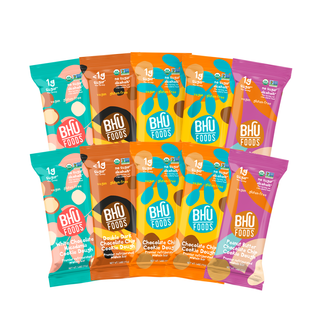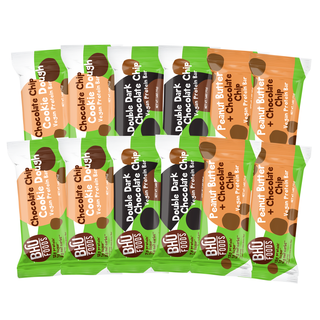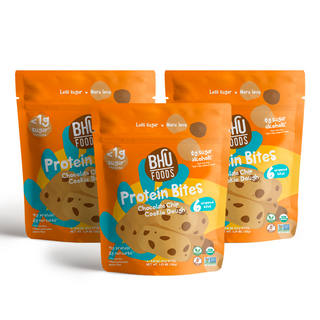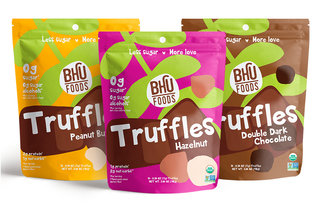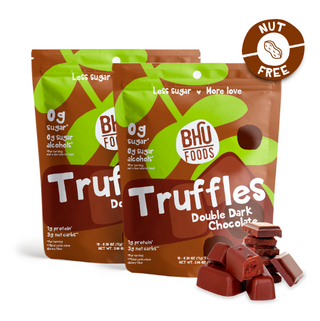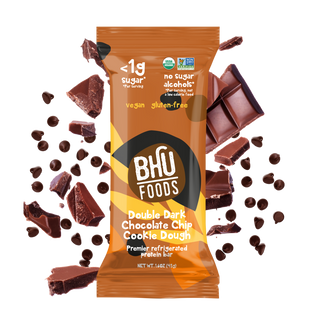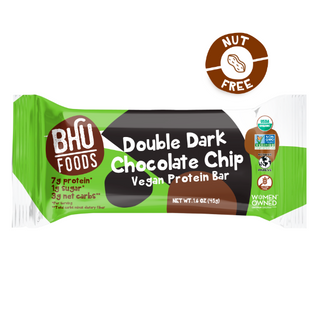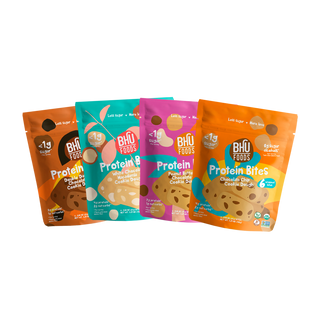
Are Protein Bars Healthy?
One fitness coach says stay away, another blogger swears by them. For what it’s worth, protein bars are the talk of the town whenever it comes to health and fitness. Whether you're chasing gains or cutting them down, or simply need something to hold you over between meetings, protein bars are a convenient source of nutrition that fits snug in your pocket. But the question is: are protein bars really healthy?
That depends on what you’re reaching for and why. There are bars out there that offer genuine health benefits, while some are nothing more than bars of candy wrapped in shiny gym branding. Let’s break down what makes a bar worth a bite, what you should avoid, and how you can choose protein bars that actually work for your goals instead of adding extra fat.
Protein Bars: What You're Getting for Your Buck
If snacks were an Olympic event, protein bars would take the gold. They’re available everywhere, from health food stores to gas stations, and online shops. These compact bites promise muscle support, energy, and convenience. But here's the thing: not all bars are what they’re marketed to be.
Some of them practice what they preach. They’re made with wholesome ingredients like fresh fruit and plant-based sources of protein. But most are overly processed and are filled to the brim with high fructose corn syrup, artificial sweeteners, or as much added sugar as any dessert your coaches tell you to avoid. In fact, some bars are so packed with saturated fat or added sugar that they do the opposite of what they’re marketed for: weight loss meal replacement. Talk about undermining your diet! Plus, let's not forget that gut discomfort that comes with bad bars.
Your best bet? If you're using protein bars as a meal, aim for around 10–20 grams of protein, at least 3-5 grams of fiber, and about 200-300 calories. For smaller snacks between meals, something like BHU Foods' Chocolate Chip Cookie Dough Premier Refrigerated Protein Bar, which offers 8 grams of protein per 45g bar, can be a smart and satisfying option.
Protein Bars vs. Energy Bars: What’s the Difference?
The terms “protein bars” and “energy bars” are thrown around to mean the same thing. That being said, there’s a key distinction between the two. Think of energy bars as the fast food variant of protein bars. They’re typically higher in carbohydrates and designed to provide quick fuel, especially for endurance athletes or people who hit the gym for longer workouts. This still doesn't mean that they help with muscle loss or gain.
On the other side of the spectrum we have protein bars. These snacks put the focus on supporting muscle mass, recovery, and satiety. The best energy bars are cocktails of healthy fats and complex carbohydrates for energy that burns long, while most protein bars are made for muscle preservation and managing the hunger that hits you before your meetings.
Whether we like it or not, some bars play jump rope with marketing. That's why you need to read those ingredient labels. When you do, you’ll see that some so-called “protein bars” are just energy bars with a sprinkle of protein and a load of added sugar.
Become a Pro at Reading Ingredient Labels
You know those labels on protein bars? They’re your best friend. Start by checking the grams of protein. Aim for at least 8 grams if you're using it as a snack, and 12–15 grams if it's a meal replacement. BHU Foods' bars, for instance, provide 8 grams of protein, making them suitable for snacking or as part of a balanced meal.
Look at:
-
Added sugar: Under 8g is ideal. Watch for hidden names like brown rice syrup or agave nectar.
-
Fiber: At least 3g helps with satiety and blood sugar balance.
-
Saturated fat: Keep it below 3g per bar, unless it’s from whole foods like coconut.
-
Calories: 150-300, depending on your goals.
Avoid artificial ingredients like sucralose like plague, and stay away from added sugar alcohols that may mess with your digestion. Here’s another pro tip: If the ingredient list is long and unrecognizable, it probably doesn’t belong in your body.
The Role of Protein Bars in High Protein Diets
If you’re building muscle, supporting weight loss, and preserving muscle mass during deficit in calories, you’ll most likely aim for diets that have more than average protein. Many people use protein bars to hit their daily protein needs without using full meals or shakes as a crutch.
Incorporating protein bars into your high protein diet is optimal, but you still need to balance them with other nutrients. Whole foods like lean meats, dairy, legumes, and eggs should still make up the bulk of your diet.
Bars are a convenient source of supplemental protein, especially post-workout or while traveling. But they shouldn’t be your only source.
Whole Foods vs. Processed Fillers
If you’re in doubt, go with whole foods. A bar made from oats, nuts, egg whites, and dried fruit will do more for your health than one that’s full of preservatives and synthetic fiber.
Look for plant-based ingredients rich in fiber to help keep blood sugar stable and digestion smooth. Dried fruit adds natural sweetness and nutrients, and plant based sources like pea or rice protein can deliver similar muscle-supporting benefits as whey.
The best bars are those you could almost recreate in your kitchen: minimal ingredients you recognize and trust. If you can name it, you can eat it. BHU Foods, for example, offers refrigerated, low carb bars that lean on plant-based ingredients. They're healthy, and they taste like actual food.
Meal Replacement Bars: Yay of Nay?
If you’re catching your breath going through a chaotic day, meal replacement bars can be a lifesaver. They’re portable, require no prep, and often contain a mix of protein, fiber, and carbohydrates. Some even add B vitamins, other nutrients, or minerals: everything you need to mimic a full meal.
If that sounds too good to be true, it is. Because not all bars make the cut and not all are created equal. Some are low on fiber or packed with large amounts of added sugar and saturated fat - which don’t do you any favors.
If you rely on bars often, try to choose options with balanced macronutrients and useful ingredients. Your bar should leave you satisfied. If it’s making you snack again in 30 minutes, it’s probably not a good one.
Remember: use them as a backup, not your Plan A.
Weight Loss: Choosing the Right Bar
If you’re trying to lose weight, protein bars can help; but only if you’re mindful. A good bar should help you feel full and energized without overloading on added sugar or fat. Look for options packing lower calories (around 150-200), with at least 10 grams of protein and a few grams of fiber. BHU Foods' bars fit this profile, offering 8 grams of protein and only 1 gram of sugar per bar.
Marketing is everything. Many bars advertise themselves as weight loss’s best friend, but actually backstab you with sugar or milk chocolate that throw you off your mark.
The right protein bars should align with your goals, support a balanced diet, and prevent your blood sugar from spiking. At the end of the day, avoid using bars as a license to skip meals. Meal timing still matters.
Weight Gain the Smart Way
There’s a flip side to everything. If your goal is to gain weight, you’ll need more calories. And if you value a healthy lifestyle, you need them from high quality sources. Weight gain requires a calorie surplus, so meal replacement bars with 250-300+ calories, moderate fat, and 15-20 grams of protein are the ones deserving of a bite.
If it’s muscle gain you’re after, focus on nutrient-dense bars with whole grains, healthy fats, and higher protein content. We know that taking in large amounts of added sugar just to hit the goals you have for your calories seems tempting, but don’t give in. Avoid that temptation. Muscle gain should come from a well balanced diet, not a sugar rush.
Health Benefits of Smart Snacking
Choose your protein bar well, and these are just some of the genuine benefits you’ll get:
-
Supporting lean muscle mass
-
Helping regulate blood sugar levels
-
Increasing fiber intake
-
Improving satiety and appetite control
-
Adding variety to a structured diet
What you need to balance out is moderation and quality. Need to stay on track? Go for a bar with real food ingredients and balanced nutrition. That’s because protein bars that are loaded with candy fillers might just spike and crash your energy levels, going as far as altering your body weight.
High Protein Isn’t Always Better
The math might suggest that more protein equals better health, but that’s not always the case. Sometimes, it’s better to take a less-is-more approach. Excess protein, especially if you pair it with extra calories or poor ingredient quality, can lead to digestive discomfort or even weight gain that seems to appear out of nowhere.
Many bars contain upwards of 25-30 grams of protein. This might be above your protein needs in a single sitting. Plus, who says more protein means better absorption? Go easy. Your body can only use so much at once. The right protein bar is about balance, not bulk. BHU Foods' bars offer a moderate 8 grams, which is all you need to mix up with other protein sources throughout the day.
A Convenient Source That Still Supports Your Diet
Here’s the beauty of protein bars: they’re portable. Protein bars are a convenient source of fuel when you need a quick option that doesn’t sacrifice your nutrition goals and saves you an extra trip to the store.
But don’t confuse convenience with compromise. The best bars aren’t there to sabotage your diet. They’re there to support it. When selecting bars, focus on:
-
Real food ingredients
-
Reasonable amount of calories
-
Moderate, if not as much sugar
-
A good mix of protein, fiber, and carbs
Whether you’re prepping for a workout, skipping breakfast (which we don’t recommend), or curbing a snack craving, the right bar can carry you through.
Final Thoughts: Protein Bars That Work for You
Let’s be honest: protein bars are not magic, even though we all wish they were. But they can be helpful tools whether you’re managing weight, supporting higher protein diets, or just need a healthy snack between meetings. What matters most is choosing bars that align with your lifestyle, body weight goals, and personal needs.
If the protein bar you’re holding in your hand reads like a science experiment, do yourself a favor and avoid it. Research shows that labels are a slippery slope, so look for added nutrients and skip the artificial sweeteners or sugar bombs that freely masquerade as health food.
In the end, the best bars are the ones that leave you feeling satisfied, energized, and well-fed. You don’t want to feel jittery, bloated, or confused about what you just ate.
FAQ: Quick Questions About Protein Bars
Can I eat protein bars every day?
Yes, but make sure you know why you’re doing it. In any case, moderation is key. Especially if you vary your protein bar brands and ingredients to prevent overexposure to sugar alcohols or certain additives.
Are protein bars okay for kids?
Generally, yes. But make sure your kids are eating high protein bars designed for adults. There are kid-specific options out there that come with lower protein and sugar content. Read the nutrition labels. If it’s kid-friendly, then grab it as a secondary snack for the little ones.
Can protein bars replace meals long-term?
Short answer: Not ideally. While meal replacement bars can be helpful, eating whole meals with vegetables, fresh fruit, protein, and grains is better for long-term health and digestive function. Plus, you can’t replace the feeling of having eating a hearty meal with protein bars.
Do protein bars help with sugar cravings?
They can! If it’s a bar that has more than average protein and even higher fiber, it may help you feel full and less likely to reach for dessert. Just don’t fall into the trap of bars that are sugar in disguise.
What are the healthiest types of protein bars?
The healthiest protein bars are made with real food ingredients like nuts, dried fruit, egg whites, and plant-based proteins. They don't always include whole grains, but contain moderate calories, balanced fat, and minimal added sugar. Always look for ingredient labels you can understand.
Do protein bars cause weight gain?
If you’re eating protein bars on top of your normal calories intake, yes. You’ll definitely put on extra weight. If you're trying to do the opposite, keep an eye on the content of calories and sugar levels. If you’re pushing for weight gain, peaking protein, calorie-dense bars can tool.
Why do many protein bars have a chewy texture?
That’s because of the syrups or binding agents used to hold the bar together. If there are dates or brown rice syrup in your bar, it’ll naturally tend to have this texture. It’s also sometimes caused by added fiber or protein isolates.
Are meal replacement bars better than protein shakes?
It depends. Meal replacement bars often contain more fiber and solid ingredients than protein shakes. However, a daily protein shake can also be useful, especially when paired with other nutrients. The best option depends on your lifestyle and nutrition goals.
Should I avoid bars with high saturated fat?
Yes, in most cases. While some saturated fat from ingredients like coconut is okay, a lot of bars use added fat that doesn’t contribute nutritional value. Frequent eating of high saturated fat may increase risk of heart disease.
What’s the difference between protein bars and candy bars?
Some, if not many protein bars, are actually nothing more than candy bars. They’re packed with sugar, milk chocolate, and high calorie content but minimal fiber or nutrients. If it’s a true protein bar, it supports muscle mass, keeps you full, and fits into a balanced diet.
Can I use protein bars while following a plant-based diet?
Absolutely. There are plenty of plant-based options using pea, rice, or nut-based proteins. Just make sure to check for wholesome ingredients, fiber, and enough grams of protein to meet your needs.





